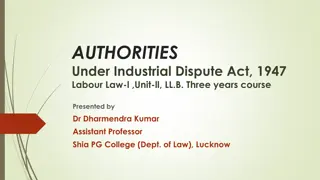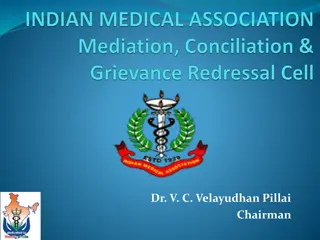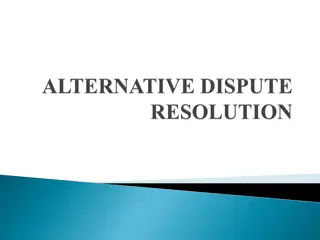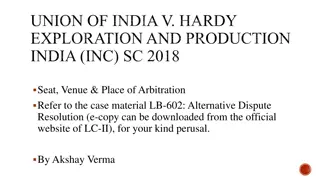Understanding the Role of Conciliation in Resolving Disputes
Conciliation is a process aimed at bringing disputing parties together to find an amicable settlement with the help of a neutral third party. This article explores the definition of conciliation, the role of a conciliator, essential skills needed, and the importance of conciliation in resolving indu
0 views • 15 slides
Authorities and Machinery for Industrial Dispute Resolution Under the Industrial Dispute Act, 1947
The Industrial Dispute Act, 1947 provides various authorities and machinery for settling industrial disputes, including conciliation, adjudication, and arbitration. Key bodies such as Works Committee, Conciliation Officer, Board of Conciliation, and more play crucial roles in promoting peaceful solu
0 views • 17 slides
Indian Medical Association Mediation and Grievance Redressal Rules
These rules outline the procedures for mediation, conciliation, and grievance redressal within the Indian Medical Association (IMA). They define key terms, establish a committee for resolving complaints between patients and doctors, and detail the process for handling grievances. The focus is on ens
2 views • 17 slides
Innovative Dispute Resolution Mechanisms: ADR in India
The concept of settling disputes through Alternative Dispute Resolution (ADR) in India introduces non-adversarial mechanisms for resolving legal suits between parties. ADR encompasses negotiation, mediation, arbitration, conciliation, and case evaluation, offering a more collaborative approach to co
0 views • 16 slides
Arbitration Venue vs. Seat Jurisdiction Issue in Union of India v. Hardy Exploration and Production India (Inc) SC 2018
This case involves a dispute between Hardy Exploration and Production India (Respondent) and the Government of India (Appellant) regarding the arbitration venue and seat. The issue revolves around the jurisdiction of Indian courts in post-award arbitration proceedings when the arbitration agreement
0 views • 17 slides
Understanding Mediation in Dispute Resolution
Mediation is an art and science of resolving disputes without litigation. It involves a neutral mediator facilitating communication and settlement between parties. Mediation offers benefits like voluntary participation, confidentiality, flexibility, cost and time efficiency, and preserving relations
0 views • 17 slides
Understanding the Role of FMCS in Federal Sector Bargaining
Explore the essential role of the Federal Mediation and Conciliation Service (FMCS) in federal sector bargaining, including its duties, services, and impact on labor relations. Learn how FMCS facilitates mediation to prevent disruptions in commerce and enhances relationships between labor and manage
0 views • 11 slides
Understanding Hybrid Dispute Resolution Processes
This content delves into the realm of hybrid dispute resolution processes, exploring concepts such as Med-Arb, Arb-Med, and Arb-Med-Arb. It highlights important terminologies, variations on hybrid themes, and ethical considerations for single neutrals in the alternative dispute resolution landscape.
0 views • 18 slides
Understanding the Industrial Disputes Act: Objectives, Meaning, and Features
The Industrial Disputes Act of 1947 aims to resolve conflicts between employers and employees, promote industrial peace, and safeguard workers' rights. Through mechanisms like conciliation, arbitration, and adjudication, this act helps prevent illegal strikes and lockouts while facilitating collecti
0 views • 16 slides
Akbar's Consolidation of Mughal Rule and Administrative Reforms in India (1206-1757)
Akbar, following Humayun's death, defeated Hemu and established Mughal rule. His reign marked significant administrative and revenue reforms, including Hindu participation and religious tolerance. Akbar's policies led to the expansion and consolidation of the Mughal Empire across northern and centra
0 views • 5 slides









